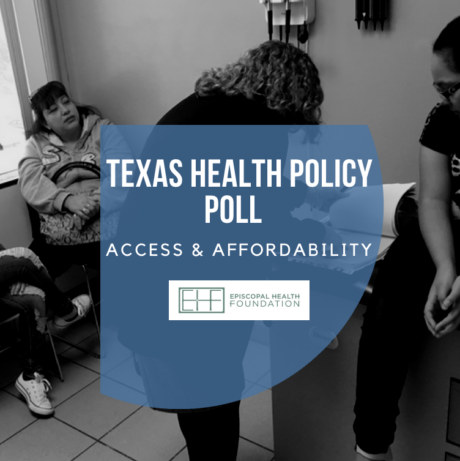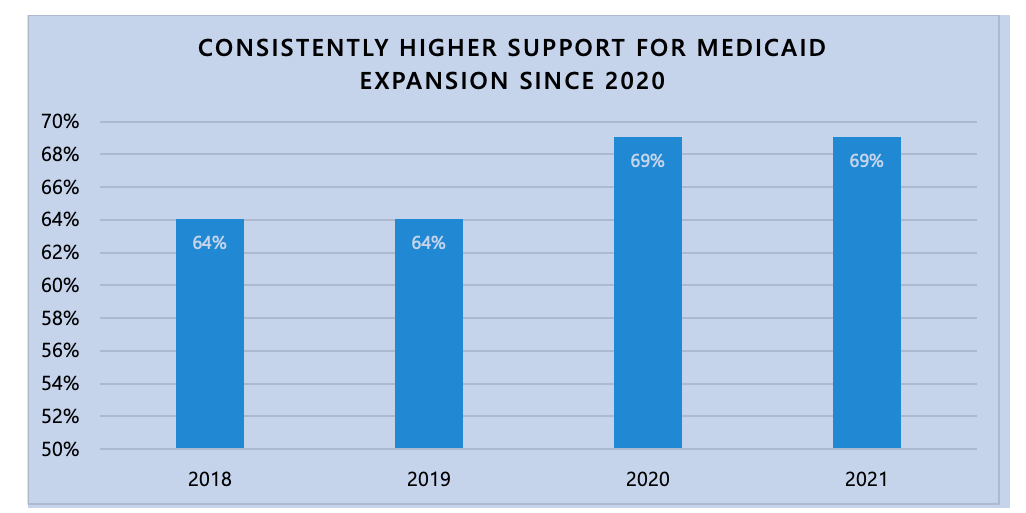Poll finds almost half of Texans say it’s difficult to afford and access care; 59% say they skipped or postponed health care because of cost
69% now support Medicaid Expansion in Texas
A large majority of Texans say it’s very important for candidates to address issues that make health care more affordable, and more than half say state lawmakers should increase state spending on health care. Those are just some the results of a new statewide Episcopal Health Foundation (EHF) Health Policy Poll on health care access and affordability in Texas.
The survey finds nearly eight in 10 Texans (76%) say making health care more affordable is a “very important” topic for candidates to address as they run for state and local public offices. Researchers found that only K-12 education (82%) and crime/public safety (77%) ranked higher on Texans’ list of key campaign issues. EHF’s poll also found that more than half of Texans (58%) say state lawmakers should increase spending for health care programs.

Affording health costs and skipping care
Almost half of those surveyed (48%) said it’s somewhat or very difficult for them to afford health care, making it one of the hardest necessities to afford. Only gasoline/transportation costs ranked higher as basic costs that were more difficult for Texas families to pay for in 2021.
The poll found that 51% of Texas adults under age 65 report that it is somewhat or very difficult to afford health care compared to 32 percent of adults ages 65 or older. Researchers found that Hispanic residents (58%) said they had more trouble affording health care than White (41%) and Black (45%) residents.
In addition to affordability issues, EHF’s poll found that nearly 6 in 10 (59%) of Texans said they have skipped or postponed care because of cost, up slightly from 53% in 2020. The rates for 2021 are similar to EHF’s poll results in 2019 (60%) and 2018 (61%). Researchers say the difference between 2021 and 2020 estimates may be due to fewer Texans seeking any type of medical care during the height of the COVID-19 pandemic.
Texas’ uninsured rate has major impact on access, affordability
The survey found that the vast majority of uninsured Texans (83%) say it’s difficult for them to pay for health care, compared to just 38% of those with health insurance. Uninsured Texans are also more likely to report difficulty paying medical bills (54%) compared to Texans with health insurance (32%).
In addition, researchers found that 78% of uninsured Texans say they skipped or postponed care in the last 12 months, compared to 56% of Texans with health insurance.

Steady support for Medicaid expansion
Researchers found that a large majority of Texans (69%) think the state should expand Medicaid to provide health insurance to potentially 1 million+ low-income Texans who are uninsured. Support for expanding Medicaid is consistent with the same percentage of support in 2020 and has increased since 2019 when EHF’s poll showed 64% of Texans supported expansion.
Again, researchers found large support for Medicaid expansion despite survey results showing that many Texans either mistakenly believe the program has been expanded (19%) or were unsure (41%). Texas is one of only 12 states not to expand Medicaid under the Affordable Care Act.
Lowering costs, increasing health insurance access are top health priorities for Texans
The poll found that majorities of Texans say top health priorities for the state legislature should be lowering costs of prescription drugs (56%), lowering health care costs (54%), and increasing access to health insurance (57%).
Other top health priorities include increasing funding for mental health programs (50%), increasing access to hospitals in rural areas (49%), and reducing the number of women who die from causes related to pregnancy and childbirth (49%).
Methodology
SSRS conducted the latest wave of the Texas Health Policy Survey on behalf of Episcopal Health Foundation from October 20 through November 18, 2021. The goal of this survey was to understand the perspectives and experiences of Texas adults regarding their health care and health care policies in the state, with a comparison to similar studies completed in 2018, 2019, and 2020. For the 2021 Texas Health Policy Survey, SSRS interviewed a representative sample of 1,203 Texas adults (age 18 or older), reached via landline (n=352) and cell phone (n=851; including n= 705 who could not be reaching via landline) random digit dialing (RDD). Interviews were conducted by live professional telephone interviewers in English or Spanish based on the respondent’s language preference.
The margin of sampling error for this study is +/- 3.5 percentage points for results based on the total sample.

